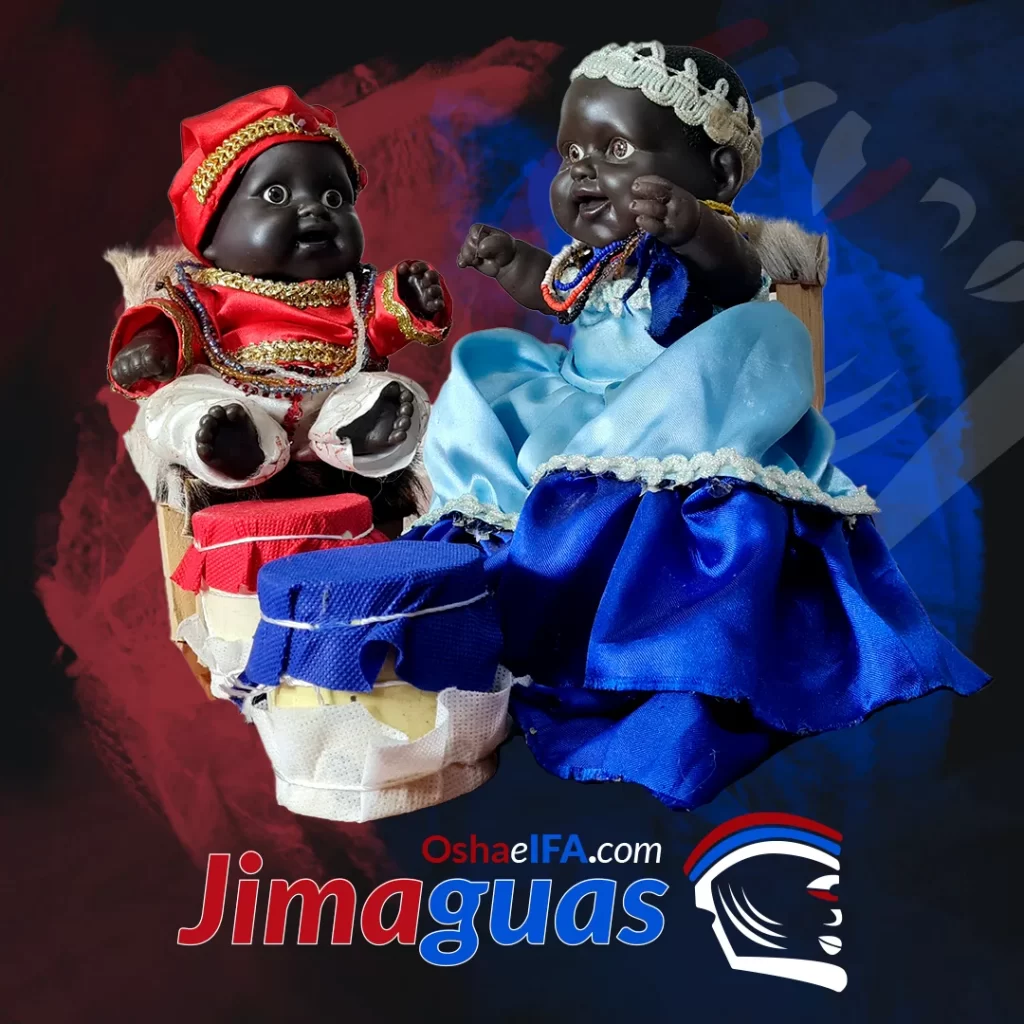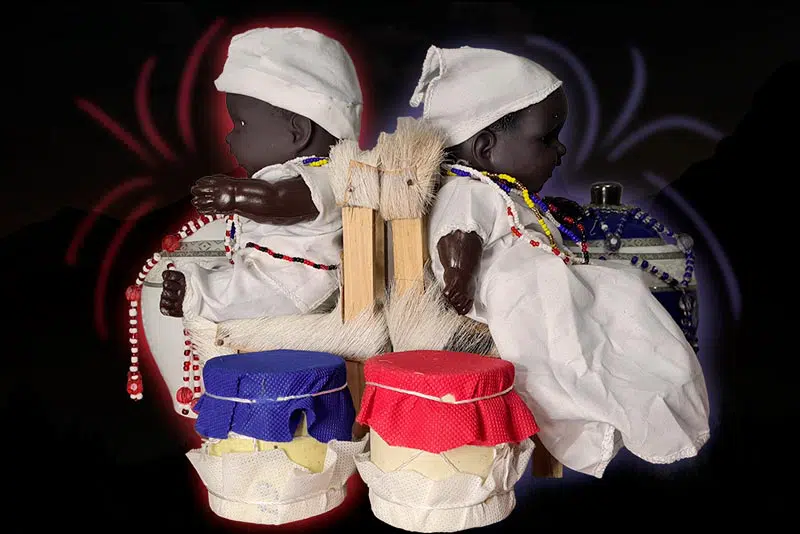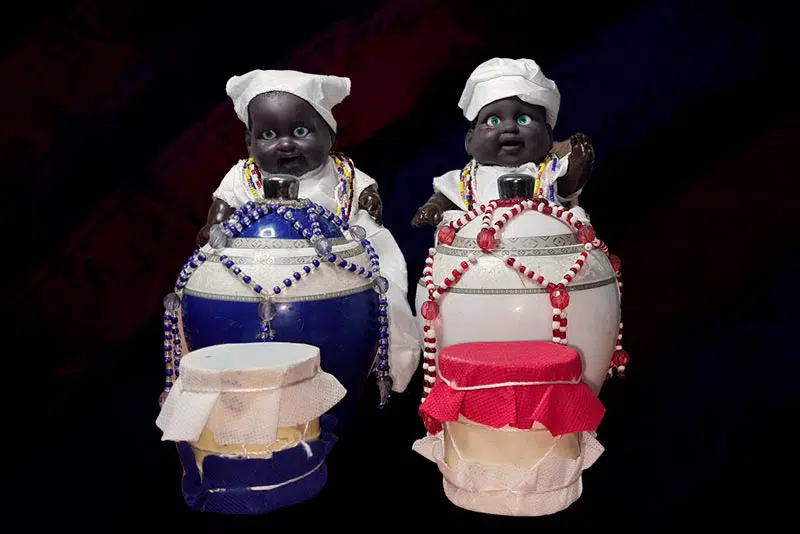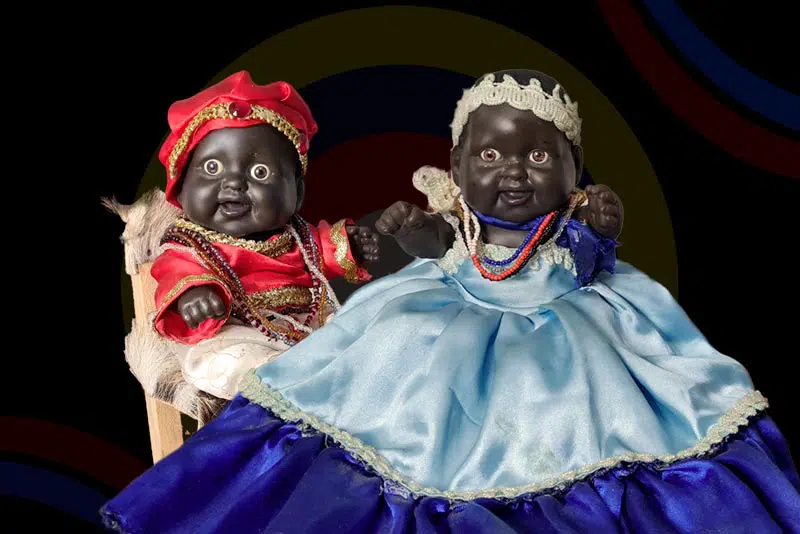The Ibeyis or Jimaguas: Twin Orishas of the Yoruba Religion

The Ibeyis, also known as Jimaguas, are twin orishas revered in Santería and the Yoruba religion. They represent duality, vitality and overcoming obstacles, being famous for their victory over dark forces.
In Santería, Ibeyis symbolize the connection between the divine and the human, highlighting the importance of youth and resilience. Their cult reflects the spiritual and cultural richness of the Yoruba tradition, where each deity has a unique role in the lives of its followers.
Who are the Jimaguas or the Ibeyis?
The Jimaguas (Ibeyis) are central figures in the Yoruba religion, representing duality and childhood within the pantheon of Orishas. Unlike the erês, which are child entities linked to all Orishas and human beings, the Ibeyis are deities in themselves, manifesting as child Orishas. This unique characteristic associates them with the principle of duality, symbolizing the beginning and growth in nature and human life.
The Ibeyis are known individually as Taewo and Kainde, and their twin nature gives them a special role in the Yoruba religion. They represent not only the beginning of natural processes such as the birth of rivers and the germination of plants, but also the beginnings and origins of human life. Their presence is a constant reminder of the importance of youth, innocence and the beginning of new cycles.
Who is the mother of the Jimaguas?
The Jimaguas are children of Oshun, the Orisha of fertility, love and rivers, and Shangó, the Orisha of thunder, justice and dance. This combination of lineages gives them unique attributes and a deep connection with both natural and spiritual elements. Raised by Oyá, the Orisha of winds and storms, Ibeyis also incorporate aspects of change and transformation into their being, reflecting the interconnectedness and richness of relationships between the Orishas.
Characteristics and Symbolism of the Ibeyis (Jimaguas)
The Ibeyis or Jimaguas, represented by figures of twins, are deities that embody fortune, luck and prosperity. Its greatest virtue is attributed to the ability to save from death and evil influences. These orishas are protectors by nature, especially on roads and trails, symbolizing guidance and protection for travelers.
Symbols and Attributes of the Ibeyis
The most prominent symbol of the Ibeyis are the drums, which according to legend, allowed them to defeat Abita, the demon. This victory symbolizes overcoming obstacles and fighting against adversity. Ibeyis come in three combinations: female and male, two males or two females, which reflects the diversity and complementarity in nature.
Sacred Colors and Numbers

The sacred colors of the Ibeyis are red, white and blue, colors that are reflected in their necklaces and ritual attributes. These colors symbolize different aspects of life and spirit, such as passion, purity and tranquility. The number two and its multiples are significant for the Ibeyis, representing duality and the union of opposite forces.
Foundation and Receptacles (Soup Tureens)
The receptacles of the Ibeyis are two small jars, often colored white and red or white and blue. Among its attributes are a hand made of snails, elongated and round stones symbolizing male and female organs, dolls dressed in blue and red, maracas and drums. These elements are not only for worship, but also serve as means to connect with these deities.
Celebration and Day of the Ibeyis
The day dedicated to the Ibeyis in the Yoruba and Santería religion is June 13. This date is a special occasion to honor these twin orishas, and is celebrated with various rituals and offerings.
During this celebration, followers of the Ibeyis usually prepare altars in their honor, adorned with their colors and sacred symbols. Offerings of sweets, fruits and other foods that are liked by these deities are made. Additionally, singing, dancing and drumming are performed to invoke his presence and blessings. The day of the Ibeyis is also a time to reflect on the principles of duality, innocence and renewal that they represent. Devotees seek his guidance to overcome obstacles and for protection in their travels and endeavors.
Sacred Herbs of the Ibeyis
- Basil (Ocimum basilicum): Used to purify and attract positive energies.
- Rosemary (Rosmarinus officinalis): Used in protection and purification rituals.
- Mint (Mentha spp.): Valued for its refreshing and purifying properties.
- Cinnamon (Cinnamomum verum): Used to attract prosperity and success.
- Chamomile (Matricaria chamomilla): Known for its calming qualities, it is used to invoke peace and harmony.
Each of these herbs has a special meaning in the cult of the Ibeyis, being used in various ritual practices to honor these deities and seek their guidance and protection.
Rituals and Offerings to the Ibeyis (Jimaguas)
Rituals and offerings to the Ibeyis are an essential part of their veneration in the Yoruba and Santería religion. These practices not only honor the twin orishas, but also seek their protection, guidance, and blessings.
Types of Offerings
Offerings to the Ibeyis include a variety of items that are especially appreciated by these child deities:
- Traditional foods: The most popular food for the Ibeyis is rice with yellow chicken, prepared with the chickens of their consecration. In addition, they are offered traditional dishes of Afro-Cuban cuisine such as okuo with abola, ekuru, adalu, ekru, olele, ekru ara, agbado agulu were elede dindin, eja dindin, bread and rosettes or popcorn.
- Sweets and Treats: Ibeyis enjoy sweets and candies, being a way to show them respect and affection.
- Fruits: They are offered all kinds of fruits such as mamey de Santo Domingo, sugar apple, soursop, canistel, orange, mango, platanillo, guava, mamoncillo and pineapple.
- Eku, Eya and Awado: These items, which include smoked jutia, smoked fish, and roasted corn, are also common offerings.
- Toys and Children's Objects: Given their childish nature, Ibeyis like toys and objects related to childhood.
Specific Rituals
The rituals dedicated to the Ibeyis vary, but usually include singing, dancing and drumming, with the aim of invoking the presence of the Ibeyis and establishing a spiritual connection with them:
- Songs and Prayers: Chants and prayers specific to the Ibeyis are a crucial part of the rituals, invoking their energy and blessings.
- Danzas: The dances are a way of expressing joy and reverence towards the Ibeyis, reflecting their childlike nature.
- Animal Sacrifices: Chickens and doves are immolated, respecting the norms and traditions of religious practice.
These rituals and offerings are essential to maintain a harmonious relationship with the Ibeyis, seeking their protection and promoting good fortune and overcoming obstacles in the lives of the devotees.
Twins in World Mythologies and Cultures
The fascination with twins transcends borders and eras, being a universal phenomenon that has captured the imagination of various cultures around the world. From Africa to America, through Europe and Asia, stories of twins have been woven into the tapestry of mythologies and cultural traditions, reflecting beliefs, values and mysteries inherent to each society. In this section, we will explore how different cultures have interpreted and revered the uniqueness of twins, thus revealing the richness and diversity of their meaning in the global cultural mosaic.
Twins (Ibejis) in Mythologies and Global Cultures
In Egyptian mythology, the Ogdoad, a set of eight primordial deities, symbolizes the essence of primordial liquid chaos before the creation of the world. These deities occur in pairs, reflecting the importance of duality in Egyptian cosmology.
In Greek and Roman mythologies, twins also play fundamental roles. The Dioscuri, Castor and Pollux, are revered twin heroes, while the founding of Rome is attributed to the twins Romulus and Remus, sons of the god Mars.
In America, Mayan mythology tells the story of the twins Hun-Hunahpú and Vucub-Hunahpú, whose adventures are central to the Popol Vuh. In Aztec mythology, duality is manifested in Ometeotl, a supreme being who possesses both masculine and feminine aspects.
In the doctrine of Zoroaster, the presence of two twin spirits, one good and one evil, symbolizes the eternal struggle between good and evil, highlighting the importance of duality in the Persian worldview.
These examples from various cultures and mythologies around the world illustrate the universality of twins as symbols of duality, balance and transformation. Its presence in so many different traditions highlights its importance not only in the specific context of the Ibeyis, but also in a broader framework of global cultural beliefs and practices.
The Ibeyis in the Catholic religion (Syncretism)

The religious syncretism between the practices of Santería and Catholicism is a fascinating phenomenon, especially in the case of the Ibeyis or Jimaguas. These Orishas find their parallel in Catholicism through the saints San Cosme and San Damiano, creating a bridge between cultures and beliefs.
Saint Cosmas and Saint Damian, known for their skill in medicine, are revered in Catholicism for their selfless dedication to the healing and well-being of others. This characteristic connects them deeply with the Ibeyis, who in Santería are seen as protectors and saviors of their devotees, fighting tirelessly against evil.
Furthermore, these Catholic saints are remembered for practicing their profession with a noble and altruistic purpose, always acting on behalf of their faith. Despite facing torture and being burned alive, their resistance and survival, until they were finally beheaded by order of Diocletian in the year 300 AD. C., highlight his bravery and dedication.
This connection between the Ibeyis and Saint Cosmas and Saint Damian extends to the fervor and determination with which both figures carry out their divine mission. Like Catholic saints, jimaguas are not afraid to face monumental challenges and continue to be a source of inspiration and protection, even in the most difficult times and in the face of the most complex adversities.
Patakíes: Stories and Legends of the Ibeyis

The patakíes, essential stories and legends in Yoruba and Santería culture, not only outline the characteristics and powers of the oríshas, but also transmit deep cultural values and teachings. Next, we will explore two significant patakís about the Ibeyis:
The Birth of the Ibeyis (odu oshe bara)
In a distant time, Oshun, pregnant, lived with Shango in the lands of ñomu ñomu. During Shango's prolonged absence, Oshun gave birth to two children, Taiwo and Kainde, an unprecedented event and the subject of criticism in her community, where she was suspected of infidelity.
Desperate at the defamation, Oshun took her children to a taro, covering them with ewe ikoko (taro), and sought advice from Orunmila. He performed divination on him and the sign of Ifa Oshe Bara was revealed, focused on the dangers of slander and defamation, and instructed him to make sacrifices and visit Olofin.
Olofin, after receiving Oshun, prophesied to him the birth of a third son, Ideu, under specific conditions next to the river. After complying with these instructions, Yalode gave birth to Ideu. Olofin then proclaimed to everyone that, from now on, women could have twins or triplets without this implying infidelity, as had been the case of Oshun with Shango.
This story explains why, in the consecration of an initiate in kariosha, it is essential to take him to the river and wrap his secret in ewe ikoko, and the importance of placing a bunch of green bananas at the entrance of the house or the saint's room, thus ensuring Shango's blessing.
You can read: Ideu, the son of Oshun
The Jimaguas Defeat the Devil
At the dawn of creation, the ways of the world were closed, and those who dared to explore them did not return. In an isolated town, a couple with twenty children saw how their men disappeared one after another on these mysterious routes. In their old age, they had twins, the Jimaguas, who brought joy and hope to the town.
Protected by Shango and Oya, and blessed by Orunmila, the Jimaguas decided to face the danger that lurked on the roads. Armed with drums and crucifixes, and following Orula's advice, they ventured towards the devil's land.
There, they challenged the devil with their music and cunning, alternating in beating the drum without him noticing. His stamina and skill finally exhausted the devil, freeing the roads and bringing peace to the land.
The victory of the Jimaguas symbolizes overcoming adversity through cunning, adaptability and spiritual guidance. This narrative highlights the importance of faith and trust in the Orishas, and how, even in the darkest moments, hope and the possibility of triumph remain intact.
Religious Practices with the Ibeyis
In the cult of the Ibeyis, there are specific practices and ceremonies that are fundamental for their veneration and connection with the faithful. These practices vary depending on whether they are carried out within the Ifá tradition or in the context of Santería. Each of these ceremonies has its own rituals, elements and meanings, deeply rooted in the rich Yoruba tradition.
How are the Ibeyis “jimaguas” received in Santería?

To receive the Ibeyis in Santería, the initiate must choose a priest or santero who will give him this foundation, becoming his godfather or godmother. It is important to have all the necessary belongings for its consecration, which include two jars or small soup tureens, two dolls with their respective outfits and set of necklaces, two drums and two little chairs.
These attributes will be delivered to the olorisha who will carry out the consecration in the company of the Oba Oriate and another Olorisha in charge of "washing" the saint. After the consecration, chickens and doves are immolated, reserving the chickens to make yellow rice that will be shared with the jimaguas and the participants in the ceremony on the third day, and then delivered into the hands of the initiate.
How are the Ibeyis set up for Ifá?
The Ibeyis, when delivered by Babalawos or "of Ifá", are known as the Ibeyis Orun. These Orishas are made from three carved wooden dolls that represent the jimaguas (Taewo and Kainde) accompanied by Ideú. They are loaded with a series of secret elements and are given to the initiate after the corresponding ceremony.
Petitions and Spiritual Works with the Ibeyis
The Ibeyis, being Orishas of great power and benevolence, are invoked in various situations to request their help and protection. The requests and spiritual works carried out with the Ibeyis vary depending on the needs and desires of the faithful, ranging from health to prosperity and protection against adversity.
What is asked of the Ibeyis?
Great blessings are requested from the Ibeyis. They are commonly invoked to ask for health, especially in times of serious difficulties or illnesses that require strength and will to be overcome. They are also asked for help in spiritual wars against malicious witches or sorcerers and to invoke protection against evil spirits. In addition, prosperity, evolution, joy and harmony in the state of mind are requested of you to achieve goals, no matter how difficult they may seem.
Works and Ebbós with the Ibeyis
The works and ebbós with the Ibeyis are specific rituals that are performed to request their intervention and help in various situations. Here are some examples:
- Work with the Ibeyis to free us from the enemy: On a white plate, place a cross of corojo oil and place 4 mamey or sapotes, spread with corojo oil and tied with white, red and blue ribbons. Each fruit is assigned the name of the person to beat. It is placed in front of the jimaguas, they are informed of the purpose and it is said: "As you ripen these fruits, so and so may be defeated by me." It is covered with a white cloth, 2 candles are lit and, when it rots, it is taken to a path.
- Ebbo with the jimaguas for prosperity: Yellow rice is prepared with chicken and placed on a mat next to sweets and fruits, in front of the jimaguas. The interested person sits on the mat, surrounded by 7 children sitting on the floor. The jimaguas are made aware that this attention is given to ask their favors regarding prosperity. Then, everything offered is shared with the children, who will eat with their hands and to their liking.
Prayers and Songs to the Ibeyis (jimaguas)

The Ibeyis, venerated in the Yoruba religion and Santería, are honored through specific prayers and songs. These linguistic and musical rituals are a way to connect with these Orishas, invoking their presence and blessings.
Prayer of the Ibeyis in Yoruba and its Translation
Se b'Olodumare Oba ni, Oba Olodumare lofejire jin or loje ko or bi'beji le ekan soso o.
Eniti 'un re ba mo l'Oluwa fun lore.
Eni Ejire ba n wuu, bi laye ko yaa ni 'wa tútù ko ni un u re n loto.
Igi Olowo mo se.
O ji fi 'lu kii be eni r'Aláàfin Orun a ji jija du ewa.
O ji fi 'lu kii be eni r'Aláàfin Orun a ji jija du ewa.
Omo to wole smello ti ò de sire alákìsa o su alákìsa d'onigba aso. Ase.
Traducción:
It is the Creator, the King, it is the Creator who blessed him with twins. That is why you had two in one go.
Cufflinks are awarded to a person whose heart is pure.
Let her have the illusions that someone with twins adopts a kind character that allows them to be honest and transparent.
I collect the firewood of that splendor.
Twin stelae on top of a roll of royal drums, similar to those of the King of Heard in Heaven who awakens to fight the battle for the art of beauty.
The twin sees the rich man and forgets about him because he loves people dressed in rags. The twin will transform that person into a model with a royal outfit and wealth, thus transform us. Asé.
I sing to the Jimaguas or Ibejis
Akuón: Omo Belli Omo Be Osha rere.
Chorus: Guereguerenya.
Akuón: Omo Belli Omo Be Osha rere.
Chorus: Guereguerenya.
Akuón: Arabauña Kairobo Iñarere.
Chorus: Guereguerenya.
Akuón: Omo Belli Omo Be Osha rere.
Chorus: Guereguerenya.
Akuón: Mellire Omoledun Méllire Omoledun Belli Mellila Abedun oyare.
Chorus: Mellire Omoledun Mellire Omoledun Belli Mellila Abedun oyare.
Akuón: Bellimo Karaa Bellimo Kara Mabo Yare.
Chorus: Bellimo Kara Bellimo Kara Mabo Yare.
Akuón: Bellimo Kara Maboyare Bellimo Kara Maboyare
Chorus: Bellimo Karaa Bellimo Kara Mabo Yare.
Akuón: Son Do lo Jimawua Son Do Alabella Aure.
Chorus: Son Do lo Jimawua Son Do Alabella Aure.
Akuón: Son Do lo Jimawua Son Do Alabella Aure.
Chorus: Son Do lo Jimawua Son Do Alabella Aure.
Phrases of the Ibeyis
The Jimaguas teach us about spiritual strength with their words:
"With the blessing of the Jimaguas at my side, no enemy will prevail against me."
This phrase reflects the belief in the protection and spiritual support that the Jimaguas provide, emphasizing the importance of faith and trust in higher forces to overcome adversity.
On the other hand, the Ibeyis advise us about perseverance and courage:
"The secret of success lies in the courage to fight tirelessly for our dreams."
This expression highlights the importance of determination and courage to achieve our goals, reminding us that fear should not be an obstacle on our path to achieving our desires.
Conclusion
In this journey through the multiple facets of the Ibeyis, we have explored from their mythical origins and legends to the religious practices and ceremonies in which they are protagonists. We have discovered how these twin Orishas not only play a crucial role in Santería and Ifá, but also how they intertwine with figures of Catholicism, demonstrating the richness and diversity of religious syncretism.
The Ibeyis, with their vibrant energy and their ability to bring blessings, health, prosperity and protection, remind us of the importance of faith, hope and the constant fight against adversity. His stories and teachings continue to resonate in the hearts of his devotees, offering a beacon of light in times of darkness and challenge.
This article has been a window into a deep and enriching spiritual world, where Ibeyis manifest as symbols of duality, balance and the eternal struggle between good and evil. May his presence continue to be a source of inspiration and guidance for all those who seek his protection and wisdom.
All the information is organized, is useful and respects the dissimilar interpretations of each follower of the forces of nature.
Thank you very much.
Thank you very much
What do I do if I lost one of my jimaguas jars?